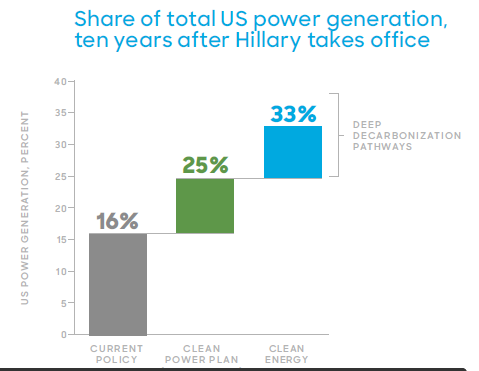Climate change is threatening cities and island nations with sea-level rise, spurring mass die-offs of sea life, generating extreme weather events with amazing frequency, and posing a rising threat to global food and water supplies. It is no longer just an issue for future generations. It’s a global crisis now, and it’s getting worse. But will the 2016 presidential candidates, Hillary Clinton and Donald Trump, even be afforded the opportunity to mention it in tonight’s debate?
(IPCC’s global warming index just recently hit 1 C above 1861-1880 temperatures in the five-year average. These temperatures are in the range of the Eemian interglacial period when global ocean levels were 15-25 feet higher than they are today. Furthermore, the current rate of warming at 0.18 C every ten years is about 30-40 times faster than at the end of the last ice age. We’re now in the process of unleashing geological forces capable of producing a mass extinction event on human timescales. Image source: Global Warming Index.)
*****
The 2016 presidential candidates’ stances on the most important issue facing this generation couldn’t be clearer.
Donald Trump believes climate change is a hoax, wants to increase fossil-fuel burning until the planet bakes and the oceans putrefy, plans to shut down the EPA, wants to back out of the Paris Climate Agreement, can’t wait to kill Obama’s Clean Power Plan, and has a noted penchant for attacking climate change solutions like wind power. Trump’s stances on climate change are so appalling that 375 of the world’s top scientists, including Stephen Hawking and 30 Nobel Prize winners, issued an open letter to the U.S. electorate, essentially pleading that we not vote for Trump on the basis of climate change alone.
The letter notes:
The United States can and must be a major player in developing innovative solutions to the problem of reducing emissions of greenhouse gases. Nations that find innovative ways of decarbonizing energy systems and sequestering CO2 will be the economic leaders of the 21st century. Walking away from Paris makes it less likely that the U.S. will have a global leadership role, politically, economically, or morally. We cannot afford to cross that tipping point.
Hillary Clinton, by comparison, wants to push a big solar energy build-out, support electric vehicles, cut carbon emissions, and ensure that policies like COP 21 and Obama’s Clean Power Plan are enacted and enhanced. Though some climate hawks might not be completely satisfied with Clinton’s record on climate change (we’re going to have to do quite a bit more than what Clinton is shooting for), the reality is that Clinton’s proposed climate policies are aimed at building on and improving Obama’s initial plans.
(Clinton plans to push renewable energy growth even faster than rates that would be achieved under Obama’s Clean Power plan. By contrast, Trump’s policies would severely reduce current initiatives, likely resulting in less than 10 percent of energy generation from clean sources by 2030. Image source: Hillary for America.)
Clinton’s overall push is for U.S. renewable energy leadership and climate action:
I won’t let anyone take us backward, deny our economy the benefits of harnessing an clean energy future, or force our children to endure the catastrophe that would result from unchecked climate change.
Hermione versus Voldemort on a Tilted Stage
It’s pretty obvious that the difference between Trump and Clinton on an issue that involves the safety and wellbeing of pretty much everyone living on Earth is stark, so much so that Joe Romm at Climate Progress has aptly characterized the debate as a contest between Hermione Granger and Voldemort.
But will the 80 million viewers of tonight’s debate actually get a chance to listen to the candidates’ stances and views on an issue that will impact them from now until the end of their natural lives? Will the debate moderator Lester Holt, a registered Republican, field questions on climate change? Or will a deafening dome of silence fall over the issue, as ice caps melt, seas rise, droughts expand, extreme weather events worsen, ocean health declines, and global temperature records continue to be shattered?
(Republican downplaying of climate change exposed by Jason Box in this poignant video. It’s stark, really, what we’re dealing with.)
Moreover, will Holt act as a moderator, or will he check out as Matt Lauer did during the dual ‘interviews’ of Clinton and Trump last month, essentially abandoning the field to Trump who is well-known for spewing out a barrage of false statements in an attempt to score points? To this point, Joe Romm notes:
…persuasive liars have an inherent advantage in any debate that is effectively unmoderated and unrefereed. This is true not merely in political debates but also in most other kinds of public debates.
Unfortunately, on the issue of fair Presidential debate representation for climate change, the record isn’t too great in 2016 so far. According to Media Matters, only 22 out of nearly 1,500 debate questions have covered climate change. As a result, a critical issue of public safety, national security, and, ultimately, survival, is not being presented to the American people. It’s a failure that generates a false impression that climate change isn’t a real problem — a lack of representation that, in the end, is both irresponsible and dangerous.
Links:
Yes, Donald Trump Did Call Climate Change a Hoax
Trump’s Plan to Drill, Baby, Drill
How Donald Trump Lost his Fight to Kill Wind Farms in Scotland
Hillary’s Plan for Half a Billion Solar Panels
‘Climate People’ to Debate Moderators: Survival Matters
Hat tip to Ailsa
Hat tip to DT Lange


















